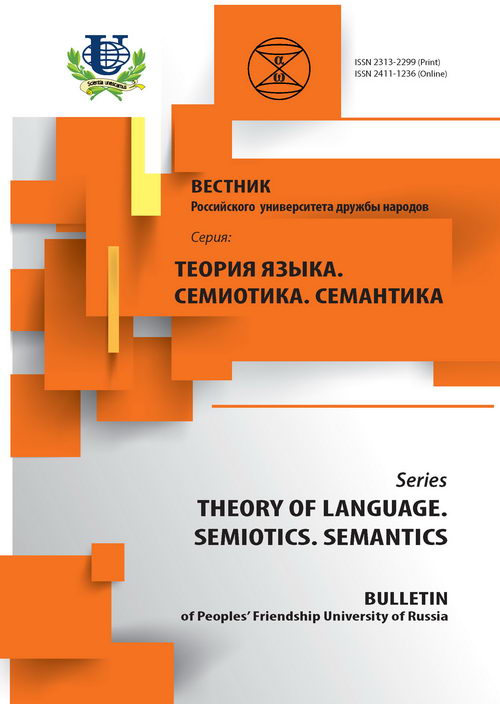No 2 (2012)
- Year: 2012
- Articles: 20
- URL: https://journals.rudn.ru/semiotics-semantics/issue/view/456
ARTICLES
Prof. O.A. Krylova's anniversary
RUDN Journal of Language Studies, Semiotics and Semantics. 2012;(2):5-5
 5-5
5-5


Structural Schemes and actual Division of a Sentence
RUDN Journal of Language Studies, Semiotics and Semantics. 2012;(2):6-14
 6-14
6-14


Turk-Slavonic language Contacts at the Crossroad of Times and Civilizations. Article One
Abstract
The article considers questions of studying Turk and Slavonic language contacts, the concept «language contacts» with reference to Kazakh-Russian to relations in XVI-XVIII centuries, and reveals the role and function of oriental words in Russian.
RUDN Journal of Language Studies, Semiotics and Semantics. 2012;(2):15-23
 15-23
15-23


Intelligibility and tradition: the principles of Bible translations into Russian
Abstract
The article deals with the principles of the Russian translations of the Holy Writ. The authors of the so-called Synodic Translation of the 19th century tried to find a compromise between the intelligibility of the Russian text and its connection with the Church Slavonic version, whereas the main point for the creators of the Modern Translation is the simplicity of the text. It is mentioned that the appearance of the new Russian translation can make the citation of the Bible text more complicated.
RUDN Journal of Language Studies, Semiotics and Semantics. 2012;(2):24-30
 24-30
24-30


The Concept of Wedding in Russian and Serbian
Abstract
The article deals with a comparative study in the field of marriage communication in Russian and Serbian lingua-cultures in axiological, symbolic, organizational and pragmatc aspects.
The main constituents of marriage communication in Russian and Serbian lingua-cultures reveal similarities, which are due to close relationship and common religion, still, each single research aspect contains specific features.
RUDN Journal of Language Studies, Semiotics and Semantics. 2012;(2):31-37
 31-37
31-37


The language worldview specifics in the fiction discourse of a Russian speaking bilingual writer
Abstract
This article is devoted to the problem of the language and culture connections. It describes the peculiarities of the language interrelations in the Republic of Kazakhstan (on the basis of the Kazakh and Russian languages), resulting in forming the specific contaminated language worldview of a bilingual writer.
RUDN Journal of Language Studies, Semiotics and Semantics. 2012;(2):38-45
 38-45
38-45


Psycholinguistic features of a conflict (in works by A.P. Chekhov)
Abstract
A conflict as a communicative act is inherent in many fields of human personal activity and is studied within the different scientific disciplines. Verbal conflicts are widely represented in fiction that enable to investigate in details the psycholinguistic aspects of their occurrence, the development and completion extrapolating some received results on understanding the essence of conflicts beyond the text. Such researches allow develop a new discipline of modern linguistics - lingvoconflictology.
RUDN Journal of Language Studies, Semiotics and Semantics. 2012;(2):46-52
 46-52
46-52


The synergetic analysis of a poetic text. Article One
Abstract
The notions a synergetic text and a synergetic marker are introduced and explained, the formula of the synergy of a poetic text is suggested and the factor of synergy is estimated. The examples of synergetic and nonsynergetic texts are given.
RUDN Journal of Language Studies, Semiotics and Semantics. 2012;(2):53-57
 53-57
53-57


 58-65
58-65


 66-70
66-70


On Consept, Notion and Word
Abstract
Concept, notion and word lay in the background of the deep and surface speech structures. Concepts reveal deep structure of speech, words express surface structure, notion is inherent only to minds and thought of people, which consists of concept and its code - a word, though it can also exist without any language code.
RUDN Journal of Language Studies, Semiotics and Semantics. 2012;(2):71-75
 71-75
71-75


Semantico-pragmatical analysis of Russian assertive utterances
Abstract
Assertive utterances make up one of the performative utterances classes revealing the illocutionary goal of stating a certain status rei. The variety of means to express the assertive goal depends on the variety of verbs forming the predicates which denote a speech act.
RUDN Journal of Language Studies, Semiotics and Semantics. 2012;(2):76-82
 76-82
76-82


Diplomatic terminology: lexicographic problems
Abstract
Language of diplomacy is rather complex and unusual system which lexicon combines an abundance of diverse terms - diplomatic, historical, culturological, linguistic, legal and of some others. In this article the lexicographic description of two terminological diplomatic dictionaries is represented, some concepts, specific terms of the dictionaries are classified, the usage possibility of the dictionaries is estimated concerning the modern diplomatic texts published on a site the Ministry of Foreign Affairs of the Russian Federation.
RUDN Journal of Language Studies, Semiotics and Semantics. 2012;(2):83-92
 83-92
83-92


Polycode vs. creolized text: terminology problems
Abstract
Terminology of semiotically complicated communication existing within the framework of modern mediacommunications, including electronic mass-media, demands descriptive and prescriptive comprehension. This article is devoted to the analysis of formation of the terminology describing texts, representing complex semiotics unity of verbal, iconic, audio and animation components.
RUDN Journal of Language Studies, Semiotics and Semantics. 2012;(2):93-102
 93-102
93-102


 103-105
103-105


Lexical and grammatical category of verbs with condition meaning in Arabic
Abstract
The article deals with the lexical and grammatical unity of Arabic verbs that express condition. A big list of Arabic words with condition meaning - physical and emotion - is provided. The attention is also paid to the grammatical characteristics and word-formation opportunity of these verbs. The author emphasizes the same features in irregular verbs.
RUDN Journal of Language Studies, Semiotics and Semantics. 2012;(2):106-113
 106-113
106-113


The International Scientific Proceedings «The ХХIIth Scientific Reading»
RUDN Journal of Language Studies, Semiotics and Semantics. 2012;(2):114-115
 114-115
114-115


Verbal Aspect: Grammatical Meaning and Context. The International Scientific Conference. September, 30th - October, 4th, 2011. Italy, Pado
RUDN Journal of Language Studies, Semiotics and Semantics. 2012;(2):116-118
 116-118
116-118


A review of the manual: L.V. Krivishlykova, N.M. Nesova. Talking the PHD Exam
RUDN Journal of Language Studies, Semiotics and Semantics. 2012;(2):119-119
 119-119
119-119


Our authors
RUDN Journal of Language Studies, Semiotics and Semantics. 2012;(2):120-121
 120-121
120-121
















